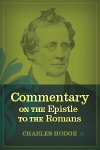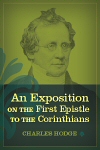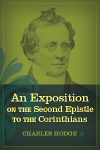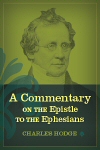Charles Hodge Commentary Collection (4 vols.)
Digital Logos Edition
Overview
The four commentaries in the Charles Hodge Commentary Collection serve as the basis for Hodge’s life and thought, making his commentaries important for both biblical scholars and theologians. The volumes contain verse-by-verse commentary on every chapter in Romans, 1 Corinthians, 2 Corinthians, and Ephesians, along with textual analysis, doctrinal points, and helpful chapter summaries. Each commentary also includes a lengthy introduction and overview written by Hodge himself, in which he examines the authorship and dating of each book, along with the historical, cultural, political, and theological context of the original audience.
Contemporary scholarship remembers Charles Hodge more for his systematic theology than his biblical exposition. Nevertheless, his whole life was primarily devoted to the critical and systematic study of the Bible, and his entire theological method is eminently biblical. In fact, Charles Hodge taught in biblical studies for more than twenty years at Princeton Theological Seminary before he was transferred, reluctantly, to the theological department. Hodge’s theology is rooted in his exposition of scripture; not the philosophical schemes and cultural whims that informed the vast majority of theological reflection in the nineteenth century. That makes the Charles Hodge Commentary Collection an important tool not only for understanding the Bible, but also for understanding Hodge’s systematic theology as a whole.
Logos is pleased to offer the unabridged version of Hodge’s commentaries, with all of Hodge’s Greek completely retained. The Charles Hodge Commentary Collection offers full access to Hodge’s work as it was originally published, making the Logos edition the preeminent standard for Hodge studies and the most accessible way to read the entirety of Hodge’s commentaries. These commentaries will benefit Bible scholars, theologians, and pastors looking for theologically-rich Bible commentaries, and are ideal for anyone interested in discovering the relationship between Hodge’s biblical exposition and his theological method. For those looking for the English-only, abridged versions, Logos also offers Charles Hodge’s commentaries on Romans, 1 Corinthians, 2 Corinthians, and Ephesians as part of the Crossway Classic Commentary Collection (13 volumes).
This title is included in the following collections
You can save when you purchase this product as part of a collection.
Logos 5 Reformed Bronze Legacy...
$89.99$89.99The Works of Charles Hodge (27...
$296.73$236.99Princeton Theology Collection ...
$522.95$349.99Logos 5 Reformed Silver Legacy...
$349.99$349.99
- $699.99
- $849.99
- $1,499.99$1,199.99
- $1,499.99
- $1,499.99
- $1,499.99
- $1,499.99
- $2,999.99$2,249.99
- $2,999.99
- $2,999.99
- $2,999.99
- $2,999.99
- $2,999.99
- $2,999.99
- $4,749.99$3,562.49
- $17,553.16$3,699.99
- $4,749.99
- $4,749.99
- $4,749.99
- $4,749.99
- $12,102.39$7,299.99
- $11,399.99
- $11,399.99
- $23,999.99$17,999.99
- $21,749.99
- $24,999.99

- Comprehensive introduction and overview for each commentary
- Summary of significant doctrinal points follows each chapter
Hodge’s method and matter make him doubly useful in commenting. He is singularly clear, and a great promoter of thought.
[Hodge] gave theological structure to the claims of reality that reminded their hearers of the limitations of human achievement and the fragility of true virtue.
—John Farina
Individual Titles

Charles Hodge introduces the book of Romans by discussing the authorship, dating, and setting of the epistle. He also devotes attention to the nature of the original audience, with particular emphasis on the historical and theological context of the church in Rome and the role of Jews in the Roman Empire—fundamental issues which comprise the backdrop of Pauline theology.
The entire volume contains verse-by-verse commentary on each chapter of Romans. Hodge examines both the Greek text and his own English translation, which means that this commentary—like all the commentaries in this collection—are as useful to New Testament scholars as they are accessible to laypersons. He concludes his commentary on each chapter with a summary of the key doctrinal points and their relevance for exegesis and interpretation.

Hodge begins his commentary on 1 Corinthians with an introduction to the geographic and political significance of the city of Corinth. In particular, he shows how the history of Corinth, its relationship to the city to Athens, and the political climate of the Roman Empire contribute to the pastoral and theological controversies which Paul aims to address.
Hodge also attends to the theological implications of Paul’s pastoral concerns for the church in Corinth—issues such as church divisions, sexual immorality, marriage and divorce, idolatry, worship, spiritual gifts, and the resurrection. More importantly, Hodge argues that 1 Corinthians has made its way into the New Testament canon because Paul’s words on these theological and pastoral issues are fit not only for his original readers, but also for the entire history of the church. This commentary on 1 Corinthians serves as an important first step toward hearing those words.

Hodge continues his commentary on Paul’s correspondence with the church in Corinth. In this volume, he addresses Paul’s journeys, the new covenant, the resurrection, reconciliation, idolatry, repentance, generosity, and suffering.

Hodge’s commentary on Ephesians begins with a discussion of the geographic and political significance of the city of Ephesus, and the unique position in which the church there found itself. In particular, says Hodge, the church struggled with how best to resist idolatry and how to relate to their broader culture—not unlike issues faced by the contemporary church.
Hodge also outlines Paul’s history with the church in Ephesus and the timeline of his work, including individuals with whom he met, disputes he resolved, and the other apostles who influenced the church in Ephesus. Hodge also notes the significance of Paul’s infamous confrontation with the supporters of Artemis, along with the relationship between the ensuing riot and the content of the Epistle.
In addition to verse-by-verse commentary and linguistic and textual analysis of every chapter in Ephesians, Hodge also comments more broadly on trends in Ephesians scholarship. He examines German critics and higher criticism in general, and he evaluates nineteenth century commentaries on Ephesians.
Product Details
- Title: Charles Hodge Commentary Collection
- Author: Charles Hodge
- Publisher: Logos Research Systems, Inc.
- Volumes: 4
- Pages: 1,801
Charles Hodge counts as one of the most influential theologians of the nineteenth century and one of Calvinism’s most ardent defenders in America. He was born in 1797 in Philadelphia to Hugh and Mary Hodge. He graduated from the College of New Jersey (Princeton University) in 1815, and was ordained in the Presbyterian Church in 1821. In 1822, at the request of Archibald Alexander, he became a professor at Princeton, and taught biblical literature and systematic theology until 1878. From 1826 to 1828, Hodge also studied in Europe, and became acquainted with Friedrich Augustus Tholuck, Wilhelm Gesenius, Augustus Neander, and Friedrich Schleiermacher.
During his tenure at Princeton, Hodge instructed more than three thousand ministers, served as moderator of the Presbyterian General Assembly in 1846, helped revise the Presbyterian Church’s Book of Discipline, and served on the Board of Foreign Missions. He also founded the Biblical Repertory and Princeton Review and served as its editor for forty-three years. In addition to his systematic theology and four Bible commentaries, Hodge also wrote books on the Presbyterian Church and published numerous articles.
Charles Hodge died on June 19, 1878. Among his last words: “To be absent from the body is to be with the Lord, to be with the Lord is to see the Lord, to see the Lord is to be like him.”
Reviews
4 ratings

George Crocker
9/4/2021

Anthony Hebert
5/17/2014

Bentley Crawford
8/15/2013

Justin Cofer
7/17/2013